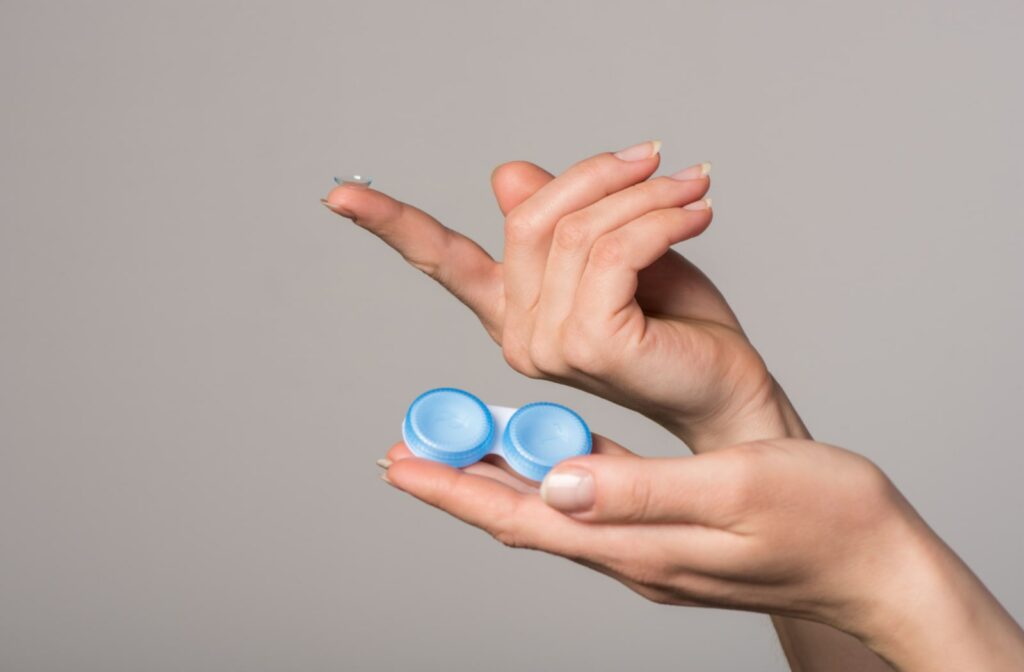More than 45 million Americans wear contact lenses to correct their vision. They can help you see just as clearly as your glasses when they don’t fit your mood or activity.
Before choosing contact lenses, it’s essential to learn their care instructions and the rules of proper wear. Depending on the lenses, your contacts can last a day, a few weeks, or longer. With an appropriate contact lens fitting with your optometrist, you can discuss the different brands and styles available to select the best contact lenses for your lifestyle.
The Difference Between Soft & Rigid-Gas Permeable Contact Lenses
When people think of contact lenses, they typically imagine soft contacts. They’re more commonly worn and preferred by many for their comfort and flexibility. However, rigid-gas permeable (RGP) lenses, or hard contact lenses, are still available and are a good choice for those who need crisp, clear vision, like those with astigmatism or keratoconus.
Soft contact lenses are made of flexible material to form to the cornea, the curved surface of the eye. They’re ideal for discontinuous wear if you like to wear glasses and contact lenses interchangeably.
RGP lenses are durable, less likely to tear, and are designed for regular wear rather than split time with frames.
The lifespan of contact lenses depends on whether they’re hard or soft, their wear schedule, and how well they’re cared for.
How Long Do Soft Contact Lenses Last?
Soft contact lenses come in 3-wear schedules:
- Extended wear disposables
- Daily wear disposables
- Daily disposables
Extended-wear contact lenses are made for continuous wear, including overnight, for up to 30 days. Your eyes need a rest between the scheduled removal and wearing a new pair. Depending on your eyes, your optometrist will recommend the best replacement schedule to keep your eyes healthy.
Daily wear lenses are designed to be worn only during the day. A single pair can last from 2 weeks to a month, depending on the window set by your optometrist and how well you follow care rules. Sleeping in your contact lenses, even for a short nap, can increase your discomfort while wearing them and make them deteriorate faster.
Daily disposable lenses are the simplest type of contact lenses. You dispose of your contact lenses every night and insert a new pair every morning. These low-maintenance lenses don’t need storage in a contact lens case or cleaning and sterilizing, limiting the chance of developing an eye infection.
How Long Do Rigid-Gas Permeable Contact Lenses Last?
With proper care, a single pair of RGP lenses can last up to 2 or 3 years. These lenses are durable and more resistant to irritating protein and mineral deposits. The flexible material, often including silicone, promotes breathability and lets oxygen pass through the lens easily, reducing dry eye.
While each pair of RGP lenses can last up to a few years, your prescription may only last for a while. Your eyes may begin changing, requiring an updated prescription and new lenses.
How Long Does Your Contact Lens Prescription Last?
Optometrists will often write a contact lens prescription valid for a year. Your vision can change quicker than you think, and an annual visit to assess your eyes ensures they’re healthy and your medicine effectively clears your vision.
By maintaining regular eye exams, your optometrist can test your vision, screen for eye conditions, and discuss your eye concerns more regularly.
Can You Wear Old Contact Lenses?
Wearing contact lenses longer than recommended can leave your eyes vulnerable to infection, like keratitis. This inflammation of the cornea can occur through improper contact lens care, wearing expired lenses, or wearing a pair of contact lenses too long.
Viruses, bacteria, fungi, or parasites could infect the cornea and lead to symptoms such as:
- Discharge from the eye
- Eye irritation
- Red eyes
- Pain in and around the eye
- Light sensitivity
- Blurry vision
- Watering eyes
If you experience any symptoms of an eye infection, stop wearing your contacts and schedule an appointment with your optometrist. The team can refresh your memory on healthy contact lens care and give tips to prevent eye infections.
How to Care for Contact Lenses
To prevent the risk of infection, proper contact lens care is crucial. During your contact lens exam and fitting, your optometrist will review all the best practices and tips to contact lens care to maintain the longevity of your contact lenses and preserve your eye health.
Some general rules and guidelines will likely include the following:
- Adhere to the replacement schedule set out by your optometrist.
- Don’t sleep in your contact lenses unless it’s appropriate for your lens type.
- Avoid getting water in your eyes while wearing contact lenses.
- Rub and rinse with your contact solution after wear to gently remove debris and deposits.
- Don’t use water in place of contact solution.
- Rinse your contact lens case with sterile contact solution and leave the case open to dry.
- Replace your contact lens case every three months or sooner.
Maintain a Regular Eye Exam Schedule
Annual eye exams keep your contact lens prescription up to date, maintain their comfort, and offer you the opportunity to discuss your eye concerns. If you’re due for your next eye exam, schedule an appointment with Precision Eye Care in Vancouver.




